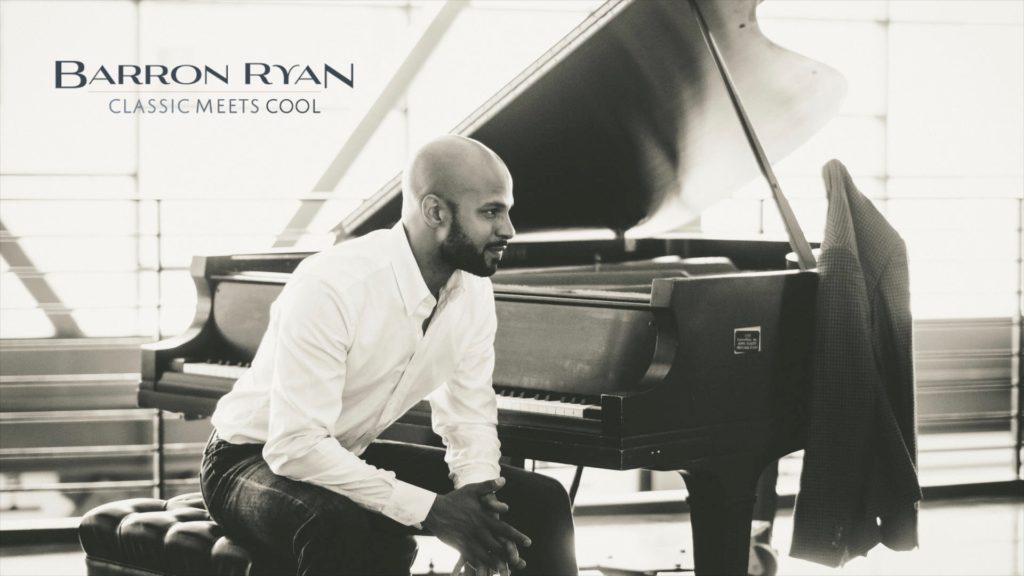Ep. 54 The Masters’ Apprentice with Barron Ryan
Brad Post, Create the Movement, host
Barron Ryan, Pianist, guest
Brad Post, Create the Movement, host: Welcome back to Create the Movement podcast. I’m sitting with a good friend of mine, Barron Ryan. Barron, how are you doing today?
Barron Ryan, Pianist, guest: I’m feeling very relieved at this point.
BP: Are you? Awesome! Barron and I have been friends, we helped start One Million Cups here in Tulsa. It’s been a few months since you and I’ve have connected. But I’ve always been a big fan of your work and consider you a friend.
BR: Thank you.
BP: When you got here you went for the shake and I went for the hug.
BR: I’m glad.
The Masters’ Apprentice’
BP: I’m really excited because I’ve got a signed copy of your new CD. We just watched a video online on Barron’s website – barronryan.com. Explaining the process that you went through. Would you mind sharing that with our listeners?
BR: Not at all. It’s Barron with two Rs and an O. Which part would you like me to explain? The making of it? Or, the content of that video itself?
BP: It’s your second album. Is that correct?
BR: Yes.
BP: It’s called ‘The Masters’ Apprentice.’ Barron is a pianist – an awesome pianist. Share a little bit about your first album and then the making of this album. Is that okay?
BR: Sure. Absolutely. I’ll give a brief history of my artistic development. I’ve been playing since I was four. My dad’s a professional pianist. When I got through with my piano performance degree, out of college I was aiming to become a concert-performing pianist. I just didn’t know how to do that. So, I thought, “Well, I should go a degree from some fancy school like Juilliard or Manhattan School of Music or Eastman.” In the Northeast because I thought I need to get where more musicians are.
I was behind because I got serious about playing the piano when I was 16. But some people either get serious or are forced to become serious by their parents, at a much earlier age. So, I knew that I was behind, but I thought, “Well, if I show these professors how hard I’m willing to work and what potential I have, then maybe they’ll accept me anyway.” But I took a lesson with one professor and he looked at the list of classical music I could play and said, “I have 13-year-old students with more repertoire than you.” And I was 23, so those are 10 years my junior.
So, I didn’t get into any of those schools and I didn’t know what to do with myself. I went into a brief satirical hip-hop career which we can talk about. That’s how I learned how to market. I went from classical piano, which almost nobody listens to, to satirical hip-hop, which almost nobody listens to.
And then I won this competition that sent me to perform in Israel. It was a classical competition so I had to come up with some program, but I just got rejected from all these schools. So I thought what could I play that would loosely fit into that requirement of being classical, but be unique enough that I could play something that 100’s of other pianist could play 10 years earlier.
So, I came up with a program that I called ‘Classical with Attitude’ which is classical music that has jazz or ragtime influence in it like George Gershwin and a couple of other composers (also artists but more specifically composers).
The concept for this album was also born at the same time because I ran out of classical music with those influences that I thought was really cool. And so, I thought what if I took jazz music and made it classical by replaying it? So, a very common thing for jazz musicians to do to learn is to transcribe which means that you listen to something that hasn’t been written down and then you write it down yourself. Which is not easy to do in any regard. If you’re doing a trumpet or a saxophone or something it’s relatively easy compared to piano, because a trumpet or a saxophone has one note at a time, and a piano has as many as 12. So, you can play two notes with your thumbs.
It was a long process, but ‘The Masters’ Apprentice’ I’m studying from these jazz masters. Music is mostly from the 1920’s through 40’s although it’s not necessarily recorded at that time, it’s all influenced from that era. I took 11 of those tunes and transcribed them all, and then learned to play them all – and that’s what this album is.
BP: That’s awesome. I think one of the most interesting things, when I saw you perform at the Hardesty Arts (AHHA) was just the way just the way that you added not only your skill but your personality into what you were playing. But you made it a story. It was: “Let me tell you about this song…” Or, “Let me let me tell you the history behind this song.” And then you added your great sense of humor. I think I laughed several times out loud. “Did you just say that?”
BR: Sometimes I do that, too!
BP: I really enjoyed hearing the story behind the music.
BR: Thank you. I think that’s what any good artist does: is not only realizes and learns how to create the art, but you have to know how to make it relate to somebody. The best way to do that is to draw upon common experiences that everyone has.
Everyone has failed at something which is why this first video talks about failure. Especially when you see me play like I do you don’t expect me to have failed. Even though we all know that everybody else fails but we don’t usually think about it. We see somebody we admire and think, “Man, they just have it all going on. They always have and they always will.” Which, of course, is false.
For one thing, you don’t expect them to have failed. So, that’s one expectation that I hope to overturn. And the other is you don’t expect them to be so upfront about it. You expect them to try to hide that they didn’t always do what they wanted to do. But part of my goal is to encourage others that it’s alright to fail and none of us are perfect. The risk or fear of failure shouldn’t inhibit you from trying.
BP: That’s awesome. Also, you said you’re going to have a series of videos coming out.
BR: Right. If I have you in a seat and you’re listening to me play and you’re listening to me talk. I’m pretty good at somebody who doesn’t like the music at all to not, at least hate being there. But to get the opportunity to get more people in seats, or to get people in seats in the first place is more difficult. So, I knew I needed to make some marketing videos that helped show who I am and what my playing is like without you having to expend any money to buy a ticket, or without some presenter having to expend any money to get me to fly out to wherever they are.
So, I have 11 videos total. Six of them are short. I don’t like to think of them as short documentaries. They’re between one and two minutes and they each focus on a different aspect of the music. This one is about failure and why I started this album in the first place. There’s one about why I selected the tunes that I did, and what I think the original artists could teach us. One is about my dad because I learned one of his solos and it’s a tribute to him essentially. And is about when I got injured three years ago practicing the hardest tune on this album called ‘Tiger Rag.’ And for 18 months I didn’t know if I would play the piano seriously again. So, there are six videoes like that.
Then there are five of me just playing. Which is a pretty good reflection of what a concert is like. It’s about 60-70% playing, probably 60% playing, and then 40% talking and interacting. Because I realized that I went from classical piano to satirical hip-hop and then to jazz and ragtime piano. So, the percentage of the world population who actually listens to that music is almost zero.
BP: So that’s why you talked 40% of the time.
BR: If you know a little bit about this you’ll be able to appreciate it.
BP: They may not like piano music, but they like you!
BR: I’ve had more than one person tell me something to that effect. “I don’t usually like ragtime, but I like it when you play it.”
The Best Business Advice Ever Received
BP: That’s awesome. One thing I wanted to ask is when we first met, you and another friend of ours, Tim, just had a great mindset on marketing and business. I was very impressed with you because a younger guy than me having the mindset of marketing. What you say is best business advice that you’ve ever received?
BR: It’s actually from Tim who got me started which was: tell the story. Which is cliche. People say it all the time. But it’s true. If you tell the story of what you’re doing you’ll start to recognize what about it is attractive and then you can emphasize those points more later on.
BP: That’s great.
BR: So, tell the story is the first. And then, I wasn’t actually told this, but I thought of it and then I had it confirmed by other people who I didn’t even mention it to. So, I didn’t come up with this, but it’s a truism just as telling the story is. And that is as an artist you want to display confident vulnerability. You want to show that you have a grasp on what you’re doing and you’re confident in your ability to create, but you’re also vulnerable enough to acknowledge that you’re not always perfect and don’t always have the answers. And that entails being humble enough to learn when you don’t know something.
So, those two things – the confidence draws people and then the vulnerability keeps them. Because if you’re confident and you’re a prick then most people are going to be, “I don’t like being around this guy.”
What’s Exciting in Business Right Now
BP: Exactly, exactly. What would you say is really exciting to you about your business right now?
BR: What’s most exciting is that I get to do whatever I want. That’s really the goal as an artist – you want to just do whatever you want. And the struggle is, “How do I figure out how to get people to pay me to do that?”
BP: Right!
BR: I am constantly learning more about it, but I think I have the key which is to tell the story. But you have to learn more and more about what that entails. But that’s the most exciting thing. I can say, “No, I don’t want to make that kind of music right now because I want to work on something else.” And I can’t be wrong because of that. I may not make as much money which is fine. I’d like to make money. I like making money, generally. But, if my primary goal were making money then I wouldn’t be in music.
Barron’s Recommended Books and Podcasts
BP: Exactly. What are some books that you’d recommend to our listeners?
BR: Tim, our mutual friend, gave me a reading list.
BP: He did? That’s right. Didn’t at our first meeting he gave you five books and you came back with them read within a week?
BR: Yeah, something like that. I think he gave two at first, and then I came back and he gave me a few more. It just snowballed from there.
Two that I really like are about referrals, as opposed to cold-calling. Really, my marketing is all referral. I’m marketing to the people who already like me because I have no idea who’s going to like what I do. Once, I played at a retirement home and one of the workers in the kitchen was standing in the door and then came out afterward and said, “Hey, I really liked that.” I could not have predicted that you would have enjoyed this music that everybody else who lives here grew up with but you’ve probably never heard before.
I market to the people who already know me. And the books are: ‘Referral of a Lifetime’ and ‘The Referral Engine.’ I haven’t read all the books on referral, but those are the two main one that I read and I thought, “Okay, this is how I’m going to market.”
There’s one about practice which is extremely important called ‘Practice Perfect.’ And, of course, I practice as a pianist, but this made me get better at practicing. A couple of things that it recommended: one was writing down what you do so that you can keep track and you can be more efficient. And now I keep a pretty detailed practice journal. I have templates that I print out for each tune and for the different scales and techniques that I practice. And then, also, you can name your practice techniques.
Also, this helped me not just in piano, but since speaking is such an integral part of my performance it also made me realize that I have to practice speaking. This is for everybody who listens to this podcast and doesn’t play a musical instrument, which is probably most people, at least to a professional level, if you’re speaking you need to practice speaking. If you’re giving feedback to somebody then you need to practice giving feedback. And you’ll realize, “Oh, I should put this here. I should say this this way.”
And so, now before a performance, last week I had an album release concert. Monday, Tuesday, and Wednesday night I took walks for at least an hour and the purpose was to get some blood flowing, but also to practice the speaking that I was going to have. So, it’s crucial.
Lastly is ‘The Halo Effect’ which is about how a lot of fallacies that we view companies and their success and people with. The Halo Effect is: I like you, Brad, because you’re a man of integrity. You do what you say you’re going to do. You tell the truth. You’re a good guy. And so, therefore, I believe that you’ll be good at whatever you do. Which, unfortunately, isn’t true because none of us are good at whatever we do. But this extends to looking at companies success, and the author will compare articles written about the CEO a year apart. The first one is very complimentary. They’re doing great. The CEO is visionary and is uncompromising and they’re doing well. Surprise, surprise their profit margins are high. And a year later the profit margins have dipped and now he’s not visionary anymore. He is now stubborn, and strong-willed. And really all that had to with was are they making money or not? If they’re making money then you think, “Everything they’re doing must be great.”
A related book is called ‘Everything is Obvious Once You Know the Answer.’ It helps me because I get frustrated sometimes looking at successful people. Also, reading biographies and things like that, and articles talking about successful people. Realizing that my view and the author’s views have been clouded just because they’re so successful. It doesn’t mean that they’re good at everything. But it also means that that is something that I want to encourage in my own work. If I can build a halo, if my design is good, if my videos are good, then you’ll believe that my playing is good, too. Even if you haven’t heard it.
I don’t want to use this in a pernicious way because, obviously, I’m talking about it on a podcast. It’s not like I’m trying to hide it. But it is important if you want people to view you positively. That whatever interaction they have with you should be positive, and then they can believe that the other stuff about you is positive, too. And you should be working to make it so.
BP: Absolutely. That’s awesome. Are there any specific podcasts that you listen to that you’d really recommend to our listeners?
BR: Yeah, there are a couple. One I’ve been listening to, for maybe a decade, not quite that long. I think I started in 2009. It’s called ‘EconTalk.’ Which is really about how people behave and interact with each other in different ways. I’m sure that’s not a great explanation, but that’s what it seems like to me. The host is very thoughtful and has people on who are also thoughtful. He’ll ask probing questions. It helps to think about different things in different ways and to recognize that the world is a lot more complicated than you think. And it also helps to try to understand how people behave.
Another podcast that I just started listening to recently, and also has videos that are better than the podcast, at least the ones that I’ve listened to so far, is ‘Clinical Psychologist’ named Jordan B. Peterson. Just the way that he thinks is fascinating; the way that he talks about human behavior. It’s hard for me to explain because I don’t fully understand it. Well, that’s mostly it. It’s fascinating.
One more. I don’t listen to it regularly, but Jordan B. Peterson had an interview on the Joe Rogan podcast which is a good place if you want to hear him talk for a bit. I like listening to Joe Rogan when I know the person he’s interviewing because he has a really free-flowing conversation with whoever that is.
BP: So, ‘The Masters’ Apprentice’ is out. Just released, right?
BR: Yes.
BP: How recently was it released?
BR: Friday.
BP: Friday!
BR: June 30th was the wide release date.
BP: So, this is one of the many interviews that you’ll be doing. David Letterman’s tomorrow night? Is that right?
BR: Well, he’s retired. He’s invited me to his chateau, so I’ll go there. He just wants to talk over dinner.
BP: You’ve got videos coming out. You can be found on Facebook, right?
BR: Search for ‘Barron Ryan’ on Facebook.
BP: Two Rs and an O.
BR: And then, on Twitter and Instagram I’m @barroncp which is a holdover from my rapping phase. That was my rapping name.
BP: Then your website.
BR: The music is available anywhere you can purchase it. It’s not available for streaming yet. But it’s available on iTunes. It’s available on CD Baby where you can get the physical copy if you still like CDs, or you can download the MP3 from that site as well.
BP: Awesome. Anything else, Barron, you want to share?
BR: That covers it. I would encourage, if you’re interested, go to my website and click ‘Play’ on that first video on the landing page. There’s an icon, you just click ‘Play’ and it will show the latest video. This week there will be a new one. It will say ‘Buy The New Album’ and that page will show you all the videos that I have about the new album. And that will give you an idea of what I’m all about.
BP: Awesome. Thanks for being with us.
BR: Happy to be here.











